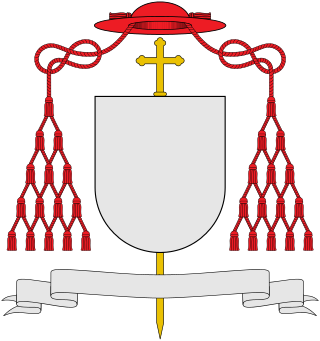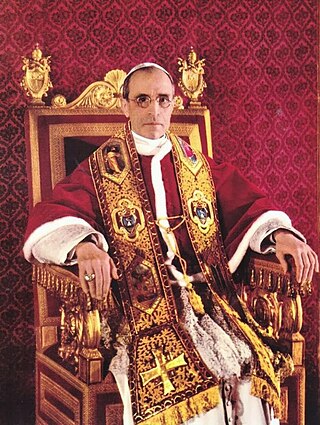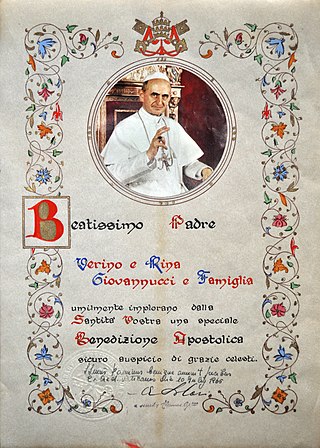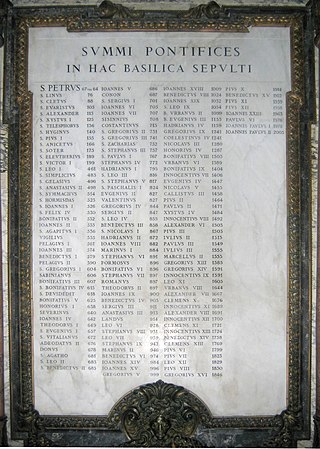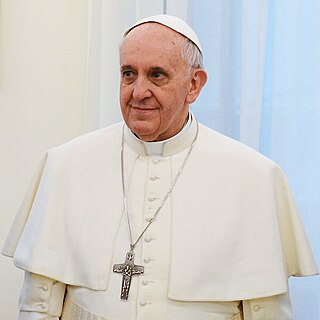| Date | Protodeacon or senior cardinal deacon | Pope elected | Announcement | Translation |
|---|
| August 29, 1484 | Francesco Piccolomini | Giovanni Battista Cibo – elected Innocent VIII | Annuntio vobis gaudium magnum: Papam habemus. Reverendissimus Dominus cardinalis Melfictensis electus est in summum pontificem et elegit sibi nomen Innocentium Octavum. [19] | I announce to you a great joy: we have a pope. The most reverend lord cardinal[, the bishop] of Molfetta has been elected as supreme pontiff, and has chosen for himself the name Innocent VIII. |
| November 1, 1503 | Raffaele Sansoni Riario | Giuliano della Rovere – elected Julius II | Papam habemus Reverendissimum Dominum Cardinalem Sancti Petri ad Vincula, qui vocatur Julius Secundus. [20] | We have a pope, the most reverend lord, cardinal [priest] of San Pietro in Vincoli, who is called Julius II. |
| March 11, 1513 | Alessandro Farnese | Giovanni de Medici – elected Leo X
Cardinal protodeacon at time of election | Gaudium magnum nuntio vobis! Papam habemus, Reverendissimum Dominum Johannem de Medicis, Diaconum Cardinalem Sanctae Mariae in Domenica, qui vocatur Leo Decimus. [21] | A great joy I announce to you! We have a pope, the most reverend lord Giovanni de' Medici, cardinal deacon of Santa Maria in Domnica, who is called Leo X. |
| October 13, 1534 | Innocenzo Cibo | Alessandro Farnese – elected Paul III | Annuntio vobis gaudium magnum: Papam habemus Reverendissimum Dominum Alexandrum Episcopum Hostiensem, Cardinalem de Farnesio nuncupatum, qui imposuit sibi nomen Paulus Tertius. [22] | I announce to you a great joy: we have a pope, the most reverend lord Alexander, designated bishop of Ostia and Cardinal Farnese, who has taken upon himself the name Paul III. |
| September 15, 1644 | Francesco Barberini | Giovanni Battista Pamphili – elected Innocent X | Annuntio vobis gaudium magnum, habemus Papam Eminentissimum et Reverendissimum Dominum Johannem Baptistum Pamphilium, qui sibi nomen imposuit Innocentium Decimum. [23] | I announce to you a great joy, we have a pope, the most eminent and reverend lord Giovanni Battista Pamphili, who has taken upon himself the name Innocent X. |
| April 7, 1655 | Giangiacomo Teodoro Trivulzio | Fabio Chigi – elected Alexander VII | Annuntio vobis gaudium magnum: Papam habemus Eminentissimum et Reverendissimum Dominum Fabium Sanctae Romanae Ecclesiae Presbyterum Cardinalem Chisium, qui elegit sibi nomen Alexandrum Septimum. [24] | I announce to you a great joy: we have a pope, the most eminent and most reverend lord Fabio, cardinal priest of the Holy Roman Church Chigi, who has chosen for himself the name Alexander VII. |
| September 21, 1676 | Francesco Maidalchini | Benedetto Odeschalchi – elected Innocent XI | Annuntio vobis gaudium magnum: Papam habemus Reverendissimum Benedictum Titulo Sancti Honufrii Cardinalem Odeschalcum, qui sibi nomen imposuit Innocentium Undecimum. [25] | I announce to you a great joy: we have a pope, the most reverend lord Benedetto, cardinal [priest] of the title of Sant'Onofrio, Odescalchi, who has taken upon himself the name Innocent XI. |
| May 8, 1721 | Benedetto Pamphili | Michelangelo Conti – elected Innocent XIII | Annuntio vobis gaudium magnii: Papam habemus. Eminentissimum et Reverendissimum Dominum Michaelem Angelum Tituli Sanctorum Quirici et Iulitta Sanctae Romanae Ecclesiae Presbyterum Cardinalem de Comitibus, qui sibi nomen imposuit Innocentius Tertius Decimus. [26] | I announce to you a great joy: we have a pope, the most eminent and reverend lord Michelangelo, cardinal priest of the Holy Roman Church of the title of Santi Quirico e Giulitta, Conti, who has taken upon himself the name Innocent XIII. |
| May 29, 1724 | Benedetto Pamphili | Vincenzo Maria Orsini – elected Pope Benedict XIII | Annuntio vobis gaudium magnum: Papam habemus: Eminentissimum et Reverendissimum Dominum Fratrem Vincentium Mariam Cardinalem Ursinum Episcopum Portuensem, qui sibi nomen imposuit Benedictus Tertius Decimus. [27] | I announce to you a great joy: we have a pope: the most eminent and reverend lord brother Vincenzo Maria Cardinal Orsini, Bishop of Porto, who has taken upon himself the name Benedict XIII. |
| July 12, 1730 | Lorenzo Altieri | Lorenzo Corsini - elected Pope Clement XII | Annuncio vobis gaudium magnum: Papam habemus. Eminentissimum et Reverendissimum Dominum Laurentium Sanctae Romanae Ecclesiae Cardinalem Corsinum Episcopum Tusculanum, qui sibi Nomen imposuit Clemens Duodecimus [28] | I announce to you great joy: we have a pope: the Most Eminent and Most Reverend Lord Lorenzo Cardinal Corsini of the Holy Roman Church, Bishop of Tusculana, who has taken upon himself the name Clement XII. |
| August 17, 1740 | Carlo Maria Marini | Prospero Lambertini - elected Pope Benedict XIV | Annuncio vobis gaudium magnum: habemus Papam, Eminentissimum ac Reverendissimum Dominum Prosperum, tituli Sanctae Crucis in Ierusalem, Presbyterum Sanctae Romanae Ecclesiae Cardinalem Lambertinum, Archiepiscopum Bononiensem, qui sibi nomen imposuit Benedictus Decimusquartus [29] | I announce to you great joy: we have a Pope: the Most Eminent and Most Reverend Lord Prospero, with the title of the Holy Cross in Jerusalem, Cardinal Lambertini, priest of the Holy Roman Church, Archbishop of Bologna, who has taken upon himself the name Benedict XIV. |
| February 15, 1775 | Alessandro Albani | Giovanni Angelo Braschi – elected Pope Pius VI | Nuntio vobis gaudium magnum: Papam habemus! Eminentissimum et reverendissimum Dominum Ioannem Angelum, tituli Sancti Onuphrii Sanctae Romanae Ecclesiae Presbyterum Cardinalem Braschi, qui sibi nomen imposuit Pius Sextus. [30] | I announce to you a great joy: we have a pope! The most eminent and reverend lord Giovanni Angelo, cardinal priest of the Holy Roman Church of the title of Sant'Onofrio, Braschi, who has taken upon himself the name Pius VI. |
| September 28, 1823 | Fabrizio Ruffo | Annibale Della Genga – elected Pope Leo XII | Annuntio vobis gaudium magnum: papam habemus, eminentissimum ac reverendissimum Dominum Annibalem, tituli Sanctae Mariae Transtiberim, presbyterum Sanctae Romanae Ecclesiae cardinalem Della Genga, qui sibi imposuit nomen Leo Duodecimus. [31] | I announce to you a great joy: we have a pope, the most eminent and reverend lord Annibale, cardinal priest of the Holy Roman Church of the title of Santa Maria in Trastevere, Della Genga, who has taken upon himself the name Leo XII. |
| February 2, 1831 | Giuseppe Albani | Mauro Cappellari – elected Pope Gregory XVI | Annuntio vobis gaudium magnum: Papam habemus! Eminentissimum ac reverendissimum Dominum Maurum Sanctae Romanae Ecclesiae Presbyterum Cardinalem Cappellari, qui sibi nomen imposuit Gregorius Sextus Decimus. [32] [33] | I announce to you a great joy: we have a pope! The most eminent and reverend lord Mauro, cardinal priest of the Holy Roman Church, Cappellari, who has taken upon himself the name Gregory XVI. |
| June 16, 1846 | Tommaso Riario Sforza | Giovanni Maria Mastai Ferretti – elected Pope Pius IX | Annuntio vobis gaudium magnum: Papam habemus! Eminentissimum et Reverendissimum Dominum Ioannem Mariam Mastai Ferretti, Sanctae Romanae Ecclesiae Presbyterum Cardinalem, qui sibi nomen imposuit Pius Nonus. [34] | I announce to you a great joy: we have a pope! The most eminent and reverend lord Giovanni Maria Mastai Ferretti, cardinal priest of the Holy Roman Church, who has taken upon himself the name Pius IX. |
| February 20, 1878 | Prospero Caterini | Vincenzo Gioacchino Raffaele Luigi Pecci -elected Pope Leo XIII | Annuntio vobis gaudium magnum; habemus papam, Eminentissimum et Reverendissimum Dominum Ioachim Pecci, qui sibi nomen imposuit Leonis Tertii Decimi. [c] | I announce to you a great joy; we have a pope: the most eminent and most reverend lord Gioacchino Pecci, who has taken upon himself the name Leo XIII. |
| August 4, 1903 | Luigi Macchi | Giuseppe Melchiorre Sarto — elected Pope Pius X | Annuntio vobis gaudium magnum; habemus papam: Eminentissimum et Reverendissimum Cardinalem Josephum Sarto, qui sibi nomen imposuit Pius Decimus. [38] [39] | I announce to you a great joy; we have a pope: the most eminent and most reverend Cardinal Giuseppe Sarto, who has taken upon himself the name Pius X. |
| September 3, 1914 | Francesco Salesio Della Volpe | Giacomo della Chiesa — elected Pope Benedict XV | Annuntio vobis gaudium magnum; habemus papam: Eminentissimum ac Reverendissimum Dominum Cardinalem Iacobum della Chiesa, qui sibi nomen imposuit Benedictum Quintum Decimum. [40] | I announce to you a great joy; we have a pope: the most eminent and most reverend lord Cardinal Giacomo della Chiesa, who has taken upon himself the name Benedict XV. |
| February 6, 1922 | Gaetano Bisleti | Achille Ratti – elected Pope Pius XI | Annuntio vobis gaudium magnum; habemus papam: Eminentissimum ac Reverendissimum Dominum Cardinalem Achillem Ratti, qui sibi nomen imposuit Pius Undecimus. [41] | I announce to you a great joy; we have a pope: the most eminent and most reverend lord Cardinal Achille Ratti, who has taken upon himself the name Pius XI. |
| March 2, 1939 | Camillo Caccia Dominioni | Eugenio Pacelli – elected Pope Pius XII | Annuntio vobis gaudium magnum; habemus papam: Eminentissimum ac reverendissimum Dominum, Dominum Eugenium Sanctae Romanae Ecclesiae cardinalem Pacelli, qui sibi nomen imposuit Pium. [16] [17] [18] | I announce to you a great joy; we have a pope: the most eminent and reverend lord, Lord Eugenio, cardinal of the Holy Roman Church, Pacelli, who takes to himself the name Pius. |
| October 28, 1958 | Nicola Canali | Angelo Giuseppe Roncalli – elected Pope John XXIII | Annuntio vobis gaudium magnum; habemus papam: Eminentissimum ac reverendissimum Dominum, Dominum Angelum Iosephum Sanctae Romanae Ecclesiae cardinalem Roncalli, qui sibi nomen imposuit Ioannis Vigesimi Tertii. [10] | I announce to you a great joy; we have a pope: the most eminent and reverend lord, Lord Angelo Giuseppe, cardinal of the Holy Roman Church, Roncalli, who takes to himself the name John XXIII. |
| June 21, 1963 | Alfredo Ottaviani | Giovanni Battista Montini – elected Pope Paul VI | Annuntio vobis gaudium magnum; habemus papam: Eminentissimum et reverendissimum Dominum, Dominum Ioannem Baptistam Sanctae Romanae Ecclesiae cardinalem Montini, qui sibi nomen imposuit Paulum Sextum. [12] | I announce to you a great joy; we have a pope: the most eminent and reverend lord, Lord Giovanni Battista, cardinal of the Holy Roman Church, Montini, who takes to himself the name Paul VI. |
| August 26, 1978 | Pericle Felici | Albino Luciani – elected Pope John Paul I | Annuntio vobis gaudium magnum; habemus papam: Eminentissimum ac reverendissimum Dominum, Dominum Albinum Sanctae Romanae Ecclesiae cardinalem Luciani, qui sibi nomen imposuit Ioannis Pauli Primi. [11] | I announce to you a great joy; we have a pope: the most eminent and reverend lord, Lord Albino, cardinal of the Holy Roman Church, Luciani, who takes to himself the name John Paul I. |
| October 16, 1978 | Karol Wojtyła – elected Pope John Paul II | Annuntio vobis gaudium magnum; habemus papam: Eminentissimum ac reverendissimum Dominum, Dominum Carolum Sanctae Romanae Ecclesiae cardinalem Wojtyła, qui sibi nomen imposuit Ioannis Pauli. [6] | I announce to you a great joy; we have a pope: the most eminent and reverend lord, Lord Karol, Cardinal of the Holy Roman Church, Wojtyła, who takes to himself the name John Paul. |
| April 19, 2005 | Jorge Medina | Joseph Ratzinger – elected Pope Benedict XVI | Fratelli e sorelle carissimi!
¡Queridísimos hermanos y hermanas!
Biens chers frères et sœurs!
Liebe Brüder und Schwestern!
Dear brothers and sisters!
Annuntio vobis gaudium magnum; habemus papam: Eminentissimum ac reverendissimum Dominum, Dominum Iosephum Sanctae Romanae Ecclesiae cardinalem Ratzinger, qui sibi nomen imposuit Benedicti Decimi Sexti. [4] | (“Dear brothers and sisters” in Italian, Spanish, French, German, and English) I announce to you a great joy; we have a pope: the most eminent and reverend lord, Lord Joseph, Cardinal of the Holy Roman Church, Ratzinger, who takes to himself the name Benedict XVI. |
| March 13, 2013 | Jean-Louis Tauran | Jorge Mario Bergoglio – elected Pope Francis | Annuntio vobis gaudium magnum; habemus papam: Eminentissimum ac reverendissimum Dominum, Dominum Georgium Marium Sanctæ Romanæ Ecclesiæ Cardinalem Bergoglio, qui sibi nomen imposuit Franciscum. [9] | I announce to you a great joy; we have a pope: the most eminent and reverend lord, Lord Jorge Mario, Cardinal of the Holy Roman Church, Bergoglio, who takes to himself the name Francis. |

